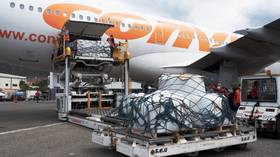Three UNKNOWN microbes found on International Space Station may help grow plants on MARS
NASA has announced the discovery and isolation of four strains of bacteria at different locations aboard the ISS, three of which were previously unknown to science and may unlock the future of space farming.
The known microbe was discovered nestled in an old high-efficiency particulate air (HEPA) filter returned to Earth in 2011. Two were found in an overhead panel of the ISS research station, while the third was found on the surface of its dining table.
The first was identified as Methylorubrum rhodesianum, while the remainder, IF7SW-B2T, IIF1SW-B5, and IIF4SW-B5, are all newly discovered members of the family Methylobacteriaceae.
This particular family is known to promote plant growth and help fight off plant pathogens – two abilities that would be extremely useful in space farming in microgravity environments such as the space station, but also in possible future colonies on Mars.
Also on rt.com Mars colony game changer: New technology can extract water and fuel from salty waterSo far, approximately 1,000 samples have been collected from various locations on the ISS and are awaiting transport back to Earth for analysis, though the long-term goal is to develop an in-situ molecular biology lab for the express purpose of analyzing these space-borne microbes.
There is still a long way to go before humanity can grow enough food in space to become a long-term, independent space-faring species, but each one of these serendipitous finds brings us a step closer to exploring the stars with manned spaceflight missions.
Also on rt.com Elon Musk’s plans for life on Mars a ‘dangerous delusion’, British chief astronomer saysThink your friends would be interested? Share this story!













